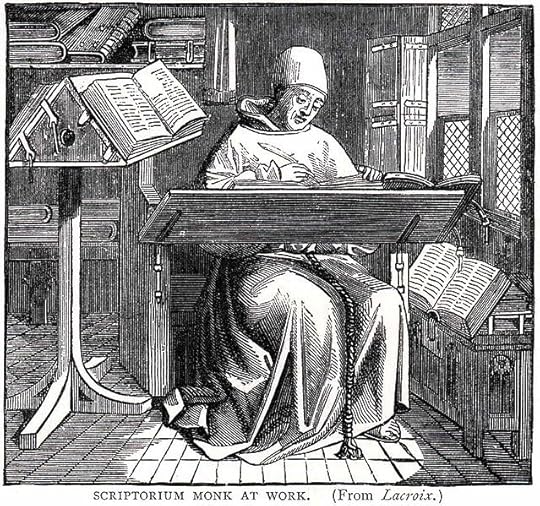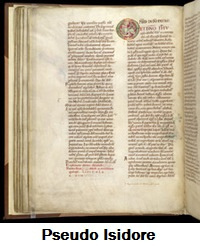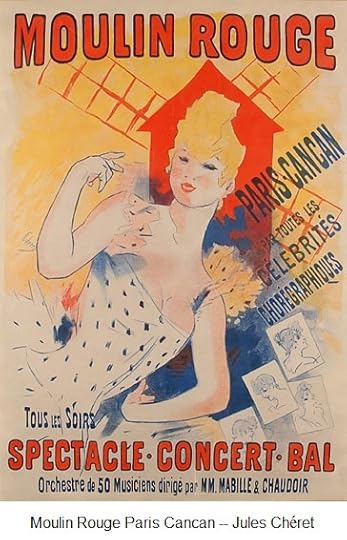Galen Watson's Blog: The Psalter, page 2
March 3, 2013
The Pope--A Medieval Invention
 With Pope Francis’ speedy election by the College of Cardinals, Catholics are holding their collective breath to see which way the newest pontiff steers the church. Papal Conclaves are an old tradition, but not as old, or as traditional, as you might think. In fact, the papacy--with the pope as titular head of all Catholics—only dates to early medieval times, to the mid-ninth century. And the Vatican’s authority comes, not from earliest Catholic tradition, but from a collection medieval documents penned in the Picardy region of northern France.
With Pope Francis’ speedy election by the College of Cardinals, Catholics are holding their collective breath to see which way the newest pontiff steers the church. Papal Conclaves are an old tradition, but not as old, or as traditional, as you might think. In fact, the papacy--with the pope as titular head of all Catholics—only dates to early medieval times, to the mid-ninth century. And the Vatican’s authority comes, not from earliest Catholic tradition, but from a collection medieval documents penned in the Picardy region of northern France. Nestled in the Somme river valley, at the confluence of the Ancre river, lies the town of Corbie. The historic town surrounds Corbie Abbey, founded in the seventh century by Saint Balthild, Queen of the Franks. But it wasn’t always an abbey. In the ninth century, Corbie was one of the most powerful monasteries in the Holy Roman Empire—more powerful even than Saint Denis in Paris.
 So what was so important about the goings on in ninth-century Corbie Monastery that made it so powerful? Those industrious monks were hard at work in the scriptorium manipulating the world, but more on that later. First, a bit about the monastery. It was founded around 660 A.D. and by the ninth century, Corbie had become one of the largest monasteries in France. As it grew in size, so, too, did its influence. Corbie Abbots were granted the same rank as counts, and were exempted from the authority of the bishop of the diocese. The monastery was even given the right to mint its own currency!
So what was so important about the goings on in ninth-century Corbie Monastery that made it so powerful? Those industrious monks were hard at work in the scriptorium manipulating the world, but more on that later. First, a bit about the monastery. It was founded around 660 A.D. and by the ninth century, Corbie had become one of the largest monasteries in France. As it grew in size, so, too, did its influence. Corbie Abbots were granted the same rank as counts, and were exempted from the authority of the bishop of the diocese. The monastery was even given the right to mint its own currency!But Corbie’s real importance was its extensive library, scriptorium and, most importantly, its scholars. Under the watchful eyes of theological geniuses, like Hadoard and Ratramnum, scribes produced mountains of philosophical, historical and theological treatises. But that’s not all they manufactured. Abbot Paschasius Radbertus and the scribes in his charge created the world’s greatest forgery: the Decretals of Isidore Mercator, a fake that changed western Christianity forever. In fact, it wasn’t until Mussolini that a portion of Corbie’s blatant power grab was made right.
 As experts in monastic script studied the anthology of letters that comprised the Decretals of Isidore Mercator, it became obvious by the handwriting that they were forged. And while medieval theologians universally agreed that the Decretal’s one hundred letters--supposedly authored by popes and bishops during the first three centuries after Christ--gave the papacy absolute power, it was just as certain that none of the letters were written then. Each and every one had been penned in the last few years, and all of them at Corbie monastery. Curiously, many of the passages resembled the writing style of the brilliant author and theologian, Abbot Paschasius Radbertus.
As experts in monastic script studied the anthology of letters that comprised the Decretals of Isidore Mercator, it became obvious by the handwriting that they were forged. And while medieval theologians universally agreed that the Decretal’s one hundred letters--supposedly authored by popes and bishops during the first three centuries after Christ--gave the papacy absolute power, it was just as certain that none of the letters were written then. Each and every one had been penned in the last few years, and all of them at Corbie monastery. Curiously, many of the passages resembled the writing style of the brilliant author and theologian, Abbot Paschasius Radbertus. Tucked away in the collection of blatant forgeries was perhaps the most brazen of the church’s fakes: the Donation of Constantine. The Donation conveyed colossal power to the papacy proclaiming, among other things, that the Bishop of Rome was Christ’s representative on earth, and giving him dominion over all the churches of God in the whole world!
Pope Leo IV relied on the Donation to command that the title Pope would be reserved exclusively for the Bishop of Rome. Bishops the world over were confused, since they were already called pope--which simply meant father--by their congregations. Even priests were affectionately called pope. The Patriarchs of Alexandria and Africa and the Patriarchs of Antioch and Constantinople, also popes, protested the effrontery.

So what does it all mean? Before the ninth century, there was no pope, at least not as we know the papacy today. The Pope was nothing more than the Bishop of Rome, and had no authority outside the Roman diocese. Nor did the Bishop of Rome have any authority over any other bishop or even priest outside his bishopric. That all changed with the Isidore fake. And based on the Donation of Constantine forgery, the church seized land that became the Papal States. Mussolini took back most of the land in 1929, but the church still retains land that it claimed based on the forgery—land that today is its own country: The Vatican.
Published on March 03, 2013 09:57
•
Tags:
papal-conclave, pope, prophecy-of-the-popes, saint-malachy
February 22, 2013
St. Malachy and the Prophesy of the Last Pope
 The media is abuzz after the announcement of Pope Benedict’s pending retirement. Not just the usual speculation about possible candidates, what country they’re from, or whether they’ll be Italian, but also a medieval Irish saint’s prophecy about the last pope and the Biblical end of days.
The media is abuzz after the announcement of Pope Benedict’s pending retirement. Not just the usual speculation about possible candidates, what country they’re from, or whether they’ll be Italian, but also a medieval Irish saint’s prophecy about the last pope and the Biblical end of days.Saint Malachy was a 12th century Archbishop of Armagh, Ireland who traveled to Rome to give an accounting of his diocese. When he arrived, he fell into a trance and had a vision of the life of every pope right up to the last one. He wrote his vision down in a list called the Prophecy of the Popes. Malachy didn’t give the popes names; rather, he called them by arcane titles like religio depopulata (religion depopulated) or fides intrepida (intrepid faith).
At first, no one understood what the designations meant. Over time, they began to see that the descriptions referred to the popes’ lives or a significant event in their reign. Saint Malachy called Pope John Paul I from the half moon. His papacy began at the half moon and he died during a half moon. He named John Paul II from the eclipse of the sun. John Paul II was born during an eclipse and died during one, as well. However, the last pope, who will usher in the Bible's end of days, is the only one named: petrus romanus or Peter the Roman.
Church theologians and many historians claim the Prophecy of the Popes is a 16th-century forgery, and cite its accuracy before publication versus its inaccuracy subsequently as the rationale. But what makes Malachy’s prophecy compelling is that it follows similar themes in other prophecies about the last pope and the last days; or rather, later prophecies follow Malachy’s clairvoyance.

In the 19th century, Pope Pius X predicted that The Pope will leave Rome and, in leaving the Vatican, he will pass over the dead bodies of his priests! In 1917, Ten-year-old Lucia de Santos was visited by the Virgin Mother—Our Lady of Fatima--and given three prophecies. She kept the last vision a secret, sealed in an envelope, saying the Virgin had given instructions that it not be opened until 1960. When the time came, Pope John XXIII read her vision and fainted. Why? Because Lucia repeated the same visions as earlier popes and Malachy:
…the Holy Father passed through a big city half in ruins and half trembling with halting step, afflicted with pain and sorrow, he prayed for the souls of the corpses he met on his way; having reached the top of the mountain, on his knees at the foot of the big Cross he was killed by a group of soldiers who fired bullets and arrows at him…

According to Saint Malachy, the next pontiff will be petrus romanus, the last pope, and he will usher in the Biblical last days. But so far, the world is still here despite other predictions, including the Mayan calendar. Nevertheless, you can read about Saint Malachy and the last pope's destiny in The Psalter.

Published on February 22, 2013 06:54
•
Tags:
benedict-xvi, lucia-de-santos, malachy-prophesy, our-lady-of-fatima, peter-the-roman, petrus-romanus, prophesy-of-the-popes, saint-malachy
January 30, 2013
Dyslexic Agnostic Insomniac
 My wife and I spent a wonderful couple of days visiting friends, drinking champagne and Bordeaux, eating cheese and other munchiettes; discussing politics and pondering the meaning of life. After several excellent vintages, the inevitable jokes, puns and wordplays began. As we blew through our repertoires of witticisms, we had to resort to older ones, as in the blog’s title. One of those rhetorical excursions got me thinking about the nature of God, or more germane to The Psalter, what the earliest Christians thought about God.
My wife and I spent a wonderful couple of days visiting friends, drinking champagne and Bordeaux, eating cheese and other munchiettes; discussing politics and pondering the meaning of life. After several excellent vintages, the inevitable jokes, puns and wordplays began. As we blew through our repertoires of witticisms, we had to resort to older ones, as in the blog’s title. One of those rhetorical excursions got me thinking about the nature of God, or more germane to The Psalter, what the earliest Christians thought about God.It’s one thing to wonder if there’s a god, or whether God might be something unfathomable; or a white-bearded, fatherly figure in the sky, or even the Higgs Boson God particle. But consider the earliest Christians and what they thought about the Messiah and his relationship to God. Some thought Jesus was God incarnate. Others believed he was simply a man who was so perfect that God adopted him. Still other Christians believed Jesus came to earth only in spirit form. Of course, the Jews believed Jesus was simply one of the dozens and dozens of self-proclaimed messiahs that appeared every time they were sorely oppressed.
 To explain their many different beliefs, Christians began writing Gospels. Within a few generations, there were at least forty Gospels, which contradicted each other, and hundreds upon hundreds of letters, treatises, etc. The Jesus-is-God sect proclaimed their God-man philosophy orthodox and vilified all other beliefs as heretical. Then they came up with pejoratives to slur other Christianities. They labeled the Nazorenes (Christian Jews) as Ebionites—meaning the poor ones. However, in their connotation, Ebionite meant poor in spirit. For their part, the Ebionites smeared the God-man’s champion, Paul, claiming that he had been a Greek priest of Mithras--a competing God-man religion--who had been jilted by a wealthy Jewish widow. So he travelled to the holy land to become a Christian, since the Jews wouldn’t accept him.
To explain their many different beliefs, Christians began writing Gospels. Within a few generations, there were at least forty Gospels, which contradicted each other, and hundreds upon hundreds of letters, treatises, etc. The Jesus-is-God sect proclaimed their God-man philosophy orthodox and vilified all other beliefs as heretical. Then they came up with pejoratives to slur other Christianities. They labeled the Nazorenes (Christian Jews) as Ebionites—meaning the poor ones. However, in their connotation, Ebionite meant poor in spirit. For their part, the Ebionites smeared the God-man’s champion, Paul, claiming that he had been a Greek priest of Mithras--a competing God-man religion--who had been jilted by a wealthy Jewish widow. So he travelled to the holy land to become a Christian, since the Jews wouldn’t accept him.The Melkites viewed themselves as the original Christians and pooh-poohed all other pretenders, much to the God-man sect’s chagrin. So the God-man group transmuted the term Melkite into an insult meaning usurpers, or those who claimed their title falsely. Elementary school name calling was rampant. Imagine trying to choose a local church when each of the hundreds of choices had different opinions about who Jesus was; and had their own Gospels and scriptures to prove their point. One of The Psalter’s characters expressed his confusion:
“…I don’t understand you Christians. How can you judge what’s true and what is not?”
“That’s why we ordain priests. We study to find the truth.”
“It’s one thing to search for truth in the words of [God] and quite another to seek it out amidst a haystack of lies. Moreover, a Christian must discern which priest speaks falsely and which tells the truth? Your religion is too complicated for a simple man like me.”
Of course, it’s even more complicated, if you’re a dyslexic agnostic insomniac.
The Psalter

Published on January 30, 2013 12:32
•
Tags:
historical-christianities
January 4, 2013
Whatever Happened to Saturday Night
 It was Pooh’s blustery day in Paris as I jogged toward the Seine. The leaves on trees that lined the boulevard rattled, and some sailed to the ground. They crackled underfoot as I tread on them. Autumn is a season of introspection, and I get contemplative this time of year. I crossed the Seine at the Pont d’Iéna, and made a right on the Avenue de New York. The Eagles’ Whatever Happened to Saturday Night played on my mp3 player.
It was Pooh’s blustery day in Paris as I jogged toward the Seine. The leaves on trees that lined the boulevard rattled, and some sailed to the ground. They crackled underfoot as I tread on them. Autumn is a season of introspection, and I get contemplative this time of year. I crossed the Seine at the Pont d’Iéna, and made a right on the Avenue de New York. The Eagles’ Whatever Happened to Saturday Night played on my mp3 player.Did you ever notice how a song can transport you into the past? That happens to me a lot. Marcel Proust wrote about it brilliantly in À la recherche du temps perdu (Looking for Lost Time) – although tea and cake were his time machine. As I passed the péniches (houseboats) moored to the quai, the Eagles’ song teleported me to Saturday nights in the late 1960s. I thought about high school dances after football and basketball games, and the hormone-charged social atmospere. School dances provided a romance-laced social setting, with everything kept proper by keen-eyed teachers who surveyed the crowd, watching for dirty dancing or illicit kisses.
 Garage bands vied for gigs at junior and senior high school dances. In our little valley, a band called The Beethovens had achieved a bit of local fame. They even placed second in a Battle of the Bands in Hollywood. I had dreams of being a rocker in my early teens, and took drum lessons from their drummer, Rick Coonce, at the local music store. The lessons ended when Rick quit to form another band: The Grass Roots. Their hit, Midnight Confessions, rocked the late sixties and propelled the group into the national spotlight.
Garage bands vied for gigs at junior and senior high school dances. In our little valley, a band called The Beethovens had achieved a bit of local fame. They even placed second in a Battle of the Bands in Hollywood. I had dreams of being a rocker in my early teens, and took drum lessons from their drummer, Rick Coonce, at the local music store. The lessons ended when Rick quit to form another band: The Grass Roots. Their hit, Midnight Confessions, rocked the late sixties and propelled the group into the national spotlight. But like Woody Allen’s Midnight in Paris, I was transported once again to Normandy, four decades ago, and the bals de campagne. The bals were country dances in rural burgs during the summertime. Traveling carnivals were the thing in the sixties, and they crisscrossed the countryside, setting up their booths to hawk games of pseudo skill.
But like Woody Allen’s Midnight in Paris, I was transported once again to Normandy, four decades ago, and the bals de campagne. The bals were country dances in rural burgs during the summertime. Traveling carnivals were the thing in the sixties, and they crisscrossed the countryside, setting up their booths to hawk games of pseudo skill.A carnival tent was erected in the town square, and on Friday and Saturday nights, bands played until after midnight--and even later if the crowd could coerce them. But it was a different dance scene from high school soirées in the states. Accordion groups played traditional music for the older set, and alternated every three or four songs with a rock band for teenagers and young adults.
I was a hit with the older ladies, because my dad had taught me how to foxtrot and waltz. In return, the women-of-a-certain-age instructed me in country steps like the polka, a countrified paso doblé and tango. Around 10 pm, the older folks would head for home, leaving the teens to dance until the wee hours.
The bals de campagne don’t exist anymore. Like the rest of the world, the French countryside changed. Greater access to transportation and growth of the media rewired rural residents’ tastes, and they sought out more citified entertainment. Besides, the bals had become expensive with the hiring of security guards to keep growing groups of ruffians in check. Slowly, but surely, the bals disappeared; and a centuries-old tradition died.
I saw an advertisement for a traditional bal de campagne in one of Paris’ suburbs the other day. Of course, it was a commercial copy. Nevertheless, it seems there’s still a nostalgic interest in holding a partner and swaying to the music of yesteryear. But it reminded me that today’s world is not the world of my youth. And one day, today’s teens will see their favorite things relegated to the dust bins of history. Mostly, I’m nostalgic for that romantic social time when a man courted a partner on the dance floor in his best, or perhaps suavest, persona to attract her attention.
 I read, recently, that Rick Coonce passed away last year from heart failure, and a large part of me mourned not only his passing, but the passing of an era. And I thought to myself, start dancing before it’s too late and our hearts fail from the loss of things we loved. Who knows, perhaps the world would be more tolerant, compassionate, and peaceful if we danced together, arm-in-arm or cheek-to-cheek, swaying to the music? Rest in peace, Rick Coonce, and thanks for the good times.
I read, recently, that Rick Coonce passed away last year from heart failure, and a large part of me mourned not only his passing, but the passing of an era. And I thought to myself, start dancing before it’s too late and our hearts fail from the loss of things we loved. Who knows, perhaps the world would be more tolerant, compassionate, and peaceful if we danced together, arm-in-arm or cheek-to-cheek, swaying to the music? Rest in peace, Rick Coonce, and thanks for the good times.Postscript: Rick Coonce's bandmate, Rob Grill, also passed away last year.
Published on January 04, 2013 09:51
•
Tags:
1960s, bals-de-campagne, marcel-proust, nostalgia, renoir, the-grassroots, À-la-recherche-du-temps-perdu
December 8, 2012
Parisienne Ladies in the Hood
 I was a cash-strapped student in Paris in the early 1970s. I had arrived late and the dorms were full, so the university referred me to an apartment building in a dicey part of Montmartre. Many of the residents were ladies of the night who were past their prime, and eked out a living at the very edge of Paris’ city limit, not far from the Moulin Rouge.
I was a cash-strapped student in Paris in the early 1970s. I had arrived late and the dorms were full, so the university referred me to an apartment building in a dicey part of Montmartre. Many of the residents were ladies of the night who were past their prime, and eked out a living at the very edge of Paris’ city limit, not far from the Moulin Rouge.I found myself well ensconced in the city’s underbelly, where I learned more about people who live on the fringe than most do in a lifetime. I also got a bird’s-eye view of how society deals with its unfortunates: beggars, prostitutes, the mentally ill, and those who are just ill-suited to function in the modern world.
My tiny studio was a shabby, drafty, garret underneath the rooftop of a five-story walk up. The painted ladies introduced themselves over time, and they must have recognized someone living hand-to-mouth, because they sort of adopted me. I often came home to pots of soup or stew, baguettes, and cheese on my doorstep.

This fall, my wife and I rented an apartment in the seventh arrondisement—one of Paris’ toniest neighborhoods. We had never stayed in the seventh, and only rented here because we came on the spur of the moment, and our choices were limited. My wife is busy with her work, so in addition to writing, I’ve taken over the household duties. For the first time, I’m the one getting to know the butcher, baker, and checkout ladies at the market.
I was shopping at Carrefour for some sausages the other day. After making my choice, one of the female employees tapped me on the shoulder and shook her finger. “Not those,” she said, and pointed to her preferred brand. Ladies manning the counter at the fromagérie point out to the best cheese, and the green grocer advises which vegetables are in season.
The other night we were invited to a cocktail party at a neighbor’s, so she could introduce us to some of the building’s residents. The other guests were widows or divorcées, and what a wealth of information. We learned where to find the finest cheese, chocolate, and pastry shops, and most importantly, who not to buy from. All in all, we’re feeling quite taken care of.

I wonder what the residents, shop owners, and employees in Paris’ chic seventh neighborhood would say if I told them they remind me a bit of the ladies of easy virtue who took me under their wings forty years ago, in one of Paris’ worst neighborhoods? Because I still recall cold autumn evenings, walking up five flights of stairs to find a pot of stew on my doorstep, thanks to a few of society’s pariahs.
And today, forty years later in the tony seventh arrondisement, if you want to be well taken care of, act a bit helpless or alone. The stylish ladies of the hood are waiting to help, just like the courtesans-of-a-certain-age in naughty Montmartre forty years ago. And I smile inwardly as a verse from Leonard Cohen's Sisters of Mercy echoes in my mind: They were waiting for me when I thought That I just can't go on,...

The Psalter
Published on December 08, 2012 08:53
•
Tags:
leonard-cohen, montmartre, moulin-rouge, paris, parisian-ladies
November 23, 2012
The Egyptian - Book Review
 The Egyptian by Mika Waltari
The Egyptian by Mika WaltariMy rating: 5 of 5 stars
The Egyptian is one of the finest Egyptian historical fictions ever written. At the same time, the author, Mika Waltari, crafted an adventure novel filled with philosophical undertones that leaves the reader pondering the meaning of life. And that’s what the book is about: an Egyptian’s entire life, lived during an era of historic and religious upheaval.
Sinuhe, the protagonist, puts idealism above all else. At the same time, he has a huge character flaw: love for a woman who turns out to be nothing he imagined. Sinuhe is heroic, unbending, self-interested, and idealistic—all wrapped up in one person. But he’s a transformational character and eventually understands that the problem with the world is people like himself. Does his realization come too late?
Finnish Author, Mika Waltari, created a masterpiece with this page-turner that will leave the reader pondering the value of ones own beliefs?
View all my reviews
Published on November 23, 2012 05:53



